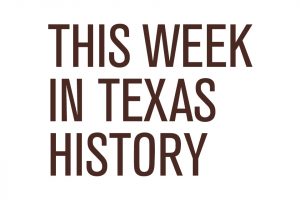After three wave-tossed months at sea, a shipload of thirsty Germans streamed ashore at Galveston on Jul. 17, 1847 and went in search of the nearest tavern.
The previous year, Prince Carl Solms-Braunfels had made the rounds of the universities in his fatherland to talk restless students into taking the Texas challenge. As a recruiter for the Adelsverein, an association of German aristocrats advocating Lone Star colonization as a way to relieve revolutionary pressures, his mission was to fire the imagination of the younger generation with glowing accounts of the New World paradise.
According to a first-hand account, the prince did a great job. He began by telling the students what they already knew — there was no place for them in crowded Germany. In Texas, however, opportunity was limited only by the talent and effort of the individual.
Solms-Braunfels found an especially receptive audience among so-called “freethinkers,” upper-class radicals who shunned the church and the Bible in an independent quest for God. Besides their nonconformist religious notions, they also sympathized with the political doctrine of a fellow German named Karl Marx.
Forty freethinkers decided to put communism to the test on the Texas frontier. Out in the wilderness, free from the pernicious influence of self-centered society, they would create a Marxist utopia called the Bettina Colony in honor of a popular left-wing writer.
Although the next leg of the journey was a short hop down the Gulf Coast to Indianola, the travelers were stranded for weeks in Galveston as their ship underwent repairs. To make a bad situation worse, the moment the vessel was ready, it was seized by the U.S. Navy for the war with Mexico.
Anxious to be on their way, the Germans hitched a ride with an intoxicated captain, who barely cleared the harbor before running his schooner aground. Oblivious to the welfare of his passengers, he attempted to go over the side.
Holding the drunken seadog at gunpoint, angry Germans demanded that he resume the voyage or observe naval tradition by going down with the ship. Just then another member of the Bettina party, who happened to be an amateur sailor, seized the helm and steered the schooner to port.
At Indianola the Adelsverein kept its end of the bargain struck months earlier in Europe. As promised, the colonists were paid $10,000 in gold and given a year’s provisions. Sensing the inexperienced pioneers did not grasp what they were going up against, the Adelsverein representative warned them not to expect further assistance after the money and supplies ran out.
Heading overland for New Braunfels, the Bettina expedition looked more like a college fraternity on a road-trip than a band of intrepid pilgrims. As one colonist frankly admitted, “We camped on the prairie and sang, drank and enjoyed ourselves as only the German student knows how to do.”
The scheduled layover of a few days at New Braunfels turned into a five-week delay, as the wayfarers waited for two comrades to recover from a bout with typhoid. Finally, in late August 1847, it was off to Fredericksburg, the westernmost German settlement.
Bidding civilization farewell in September, the carefree contingent continued the trek toward their designated tract on the banks of the Llano River. Upon reaching the site, they celebrated the end of their long journey with a boisterous party that lasted until three o’clock in the morning.
The Bettina Colony got off to an encouraging start with the energetic construction of two large, communal shelters. Since the all-male group did not have to worry about separating the sexes, they bedded down together in a 40-foot by 22-foot wooden building and a spacious adobe house.
Living comfortably off their provisions, the happy-go-lucky newcomers postponed the nasty necessity of getting down to work. Everyone preferred instead to devote his days to intellectual debates about how to put communist theory into real-world practice.
Procrastination and an aversion to manual labor were inevitable given the composition of the colony. With seven lawyers, five foresters, two doctors, two architects, an engineer, botanist, theologian and artillery lieutenant, there were far too many chiefs and too few Indians.
By the summer of 1848, the idle immigrants were running low on food and faced the unpleasant prospect of somehow supporting themselves. Under the sobering circumstances, the visionaries had no trouble choosing between the sacrifices demanded by their communist experiment and the painless alternative of joining already established German communities.
Abandoning Bettina, the German radicals left in one’s and two’s for New Braunfels, Fredericksburg and other thriving settlements. A classless utopia looked great on paper, but even 167 years ago someone had to get his hands dirty and put food on the table.
Order Bartee’s books “Murder Most Texan” and “Texas Depression-Era Desperadoes” from the “General Store” at barteehaile.com or by mailing a check for $26.65 for each copy to Bartee Haile, P.O. Box 152, Friendswood, TX 77549.






